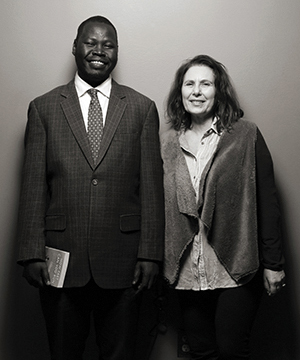
Under a clear Australian sky, Michael Majok Kuch stood patiently waiting to reunite with his mother.
It was July 2008, and it had been two decades since he had last seen her — since he fled his burning village in southern Sudan in the middle of the night as flashes of light pierced the clouded air, his childhood suspended by a civil war he was too young to understand. Just 5 years old, he dodged death on a harrowing journey through refugee camps and across borders, on a path that brought him to the United States and to a new life.
But no matter how many miles he traveled, no matter which direction he turned, he had always been facing toward this moment.
Despite the weight of it all, Kuch felt at peace as he peered over the wooden fence outside the home where his mother, separated from her children and seeking safety from the same war, had eventually resettled.
From a remove, Harriet Levin Millan watched, feeling like a mother herself.
A poet and creative writing professor in Drexel University’s College of Arts and Sciences, Millan had been introduced to Kuch earlier that year through a cultural reading program organized by the City of Philadelphia. Initially, Millan’s task was to write a short biography of Kuch for publication in a local paper that was collaborating with the program, but as she listened to his story, she wanted to do more. She had helped orchestrate this reunion.
Kuch was about to close a painful chapter in a life interrupted by conflict and loss. For Millan, though, this was a beginning.
She would later say that meeting Kuch jolted her awake, opening her eyes to the power of writing to effect social change.
“I saw how I could draw on my teaching job to help change the world,” she says.
In the years that followed, she created a program called the Reunion Project to raise funds to reunite other child refugees with their families. She reimagined her writing, her teaching and her role in the world. She learned, through Kuch, that a deep reserve of empathy is the greatest tool of a writer and a citizen alike.
At Kuch’s insistence and with his guidance, she began to write a book about his life and, in the process, change her own.
Read more in Drexel Magazine